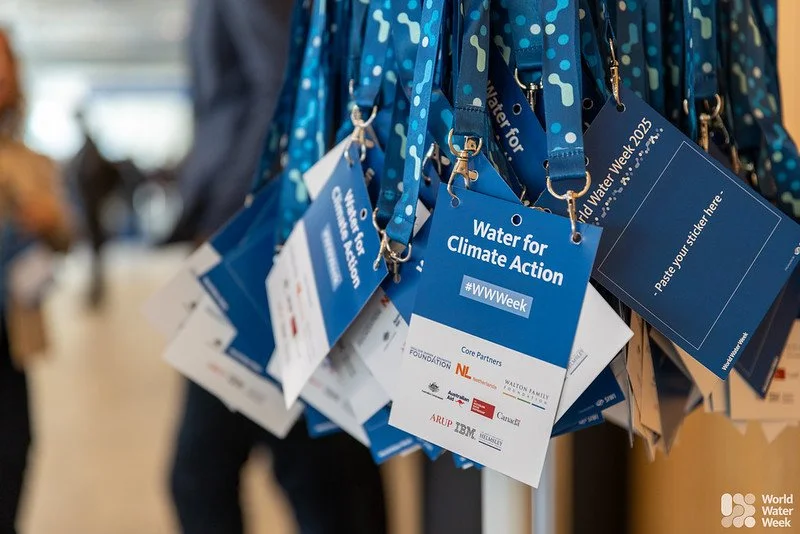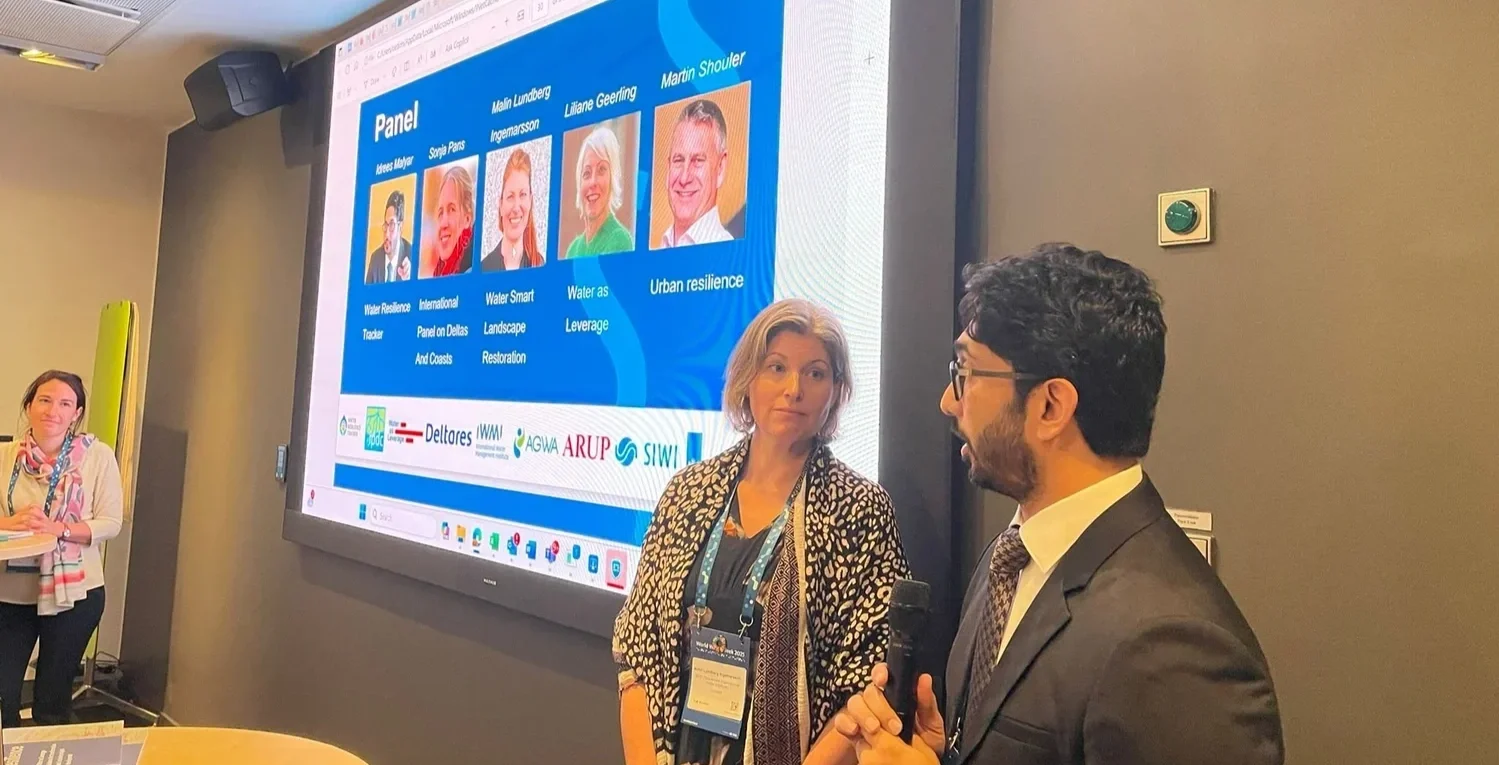Breaking Down Siloes; Building Resilience
Related to the overarching theme of 2025’s World Water Week on ‘Water for Climate Action’, the Water Resilience Tracker team launched a Global Trends Report, highlighting opportunities for action, opportunities that the Water Resilience Tracker is already acting on.
The report finds that there is a growing focus on water resilience at the global level, an encouraging insight ahead of COP30. Examples include:
The Intergovernmental Panel on Climate Change (IPCC) recognises that water is the primary medium for climate change,
Water is one of the thematic axes on the COP30 Global Climate Action Agenda
The Global Stocktake and the Global Goal on Adaptation – established in the 2015 Paris Agreement – both acknowledge the critical role of water.
While promising progress has been made, systemic water resilience still needs to be further embedded within national commitments such as Nationally Determined Contributions (NDCs) and National Adaptation Plans (NAPs). By working with countries on their NDCs and NAPs, the Water Resilience Tracker is already – successfully – putting the recommendations into action and turning political recognition into measurable action.
At World Water Week and beyond, the appetite for the Water Resilience Tracker continues to grow from governments because it offers a pragmatic approach that prioritizes concrete action over mere discourse. During the Week Ella Lazarte, CEO of Resilient Water Accelerator noted that "there is no framework for water resilience projects in many countries.”
The Tracker is already helping countries have hard conversations to enable them to consider resilience in a holistic way, boosting their climate action, and breaking down siloes.
How?
Because the Water Resilience Tracker questionnaire consists of over 100 questions – which means it can’t be answered by a single person, or government department. The questionnaire provides opportunities for collaboration and knowledge sharing across departments and ministries, identifying both technical solutions and improvements to governance. The accompanying guidance document also provides complementary information and some useful examples to follow.
This collaborative approach is crucial because the Global Trends report found that the global water-climate finance landscape remains fragmented, insufficient, and difficult to access. Andrew Roby, Senior Water Advisor, UK Foreign, Commonwealth & Development Office noted during the Week that this is the biggest challenge of this century.
“How do you create those enabling conditions?” Lazarte, Resilient Water Accelerator asked.
The Water Resilience Tracker is working to answer this critical question by providing actionable tools, system-based indicators, and country-led technical support. Its strength, says Roby, is that the Water Resilience Tracker works alongside the other initiatives in the Just Transitions for Water Security program which were conceived, not in a lab but, in the very contexts they are being used in.
Progress in Brazil
Darshini Ravindranath, Research Group Leader, International Water Management Institute (IWMI) echoed Roby’s sentiment: “One of the most inspiring things about JTWS is the local action and the collective action it inspires." Brazil’s interaction with the Water Resilience Tracker is a stellar example of such action: after initial success in pinpointing real problems on the ground the Water Resilience Tracker team wants to replicate this at the basin scale.
During World Water Week, AGWA met with colleagues from Brazil’s Ministry of Integration and the President-Director of Brazil's National Water and Sanitation Agency (ANA) to discuss the expansion of AGWA’s partnership with ANA on the Water Resilience Tracker in Brazil, as well as opportunities to highlight this work at COP30 in Belém.
Looking Ahead
The Water Resilience Tracker enables countries to integrate water resilience into national policy processes and investment planning, ensuring alignment with global frameworks while addressing locally specific risks.
With less than three months until the much-anticipated COP30 in Belém, World Water Week offered a chance to come together with partners and peers to build consensus and momentum — ensuring that action at COP30 is as impactful as possible.
Water is now increasingly recognised within UNFCCC processes, particularly through COP outcomes and the Global Goal on Adaptation (GGA). However, systemic water resilience still needs to be further embedded within national climate commitments.
The WRT was presented during a World Water Week session organized by Deltares as one of five programs that are closing this gap: driving water-resilient approaches around the world. After the presentations, breakout groups shared their feedback with the initiatives on where they can focus activities, and how different stakeholders can engage to deepen this effort.
Idrees Malyar, Director of the Water Resilience Tracker presents its successes.
The goal of these discussions was to start formulating key messages on the importance of partnerships for building water resilience collaboratively, working towards COP30, the 2026 UN Water Conference and beyond.
As we move toward COP30 in Belém, the Water Resilience Tracker isn't just measuring water resilience — it's building it. By turning complex questionnaires into collaborative conversations and fragmented approaches into integrated action, the Tracker is proving that sometimes the best way to solve the water crisis is to stop treating it as someone else's problem.
The question isn't whether water belongs in climate policy anymore, it's how quickly that integration can be done in practice to foster greater resilience in the places that are most vulnerable.
Watch the Water Resilience Tracker at World Water Week
What is the Water Resilience Tracker?
WRT operates under the Just Transitions for Water Security (JTWS) program funded by the UK Government's Foreign, Commonwealth & Development Office (FCDO) and led by the Alliance for Global Water Adaptation (AGWA).
The Tracker leverages partnerships with International Water Management Institute (IWMI), Arup, and Deltares to bring cutting-edge research, engineering expertise, and sector-specific insights to enhance its analytical capabilities and implementation reach.
Find out more >


